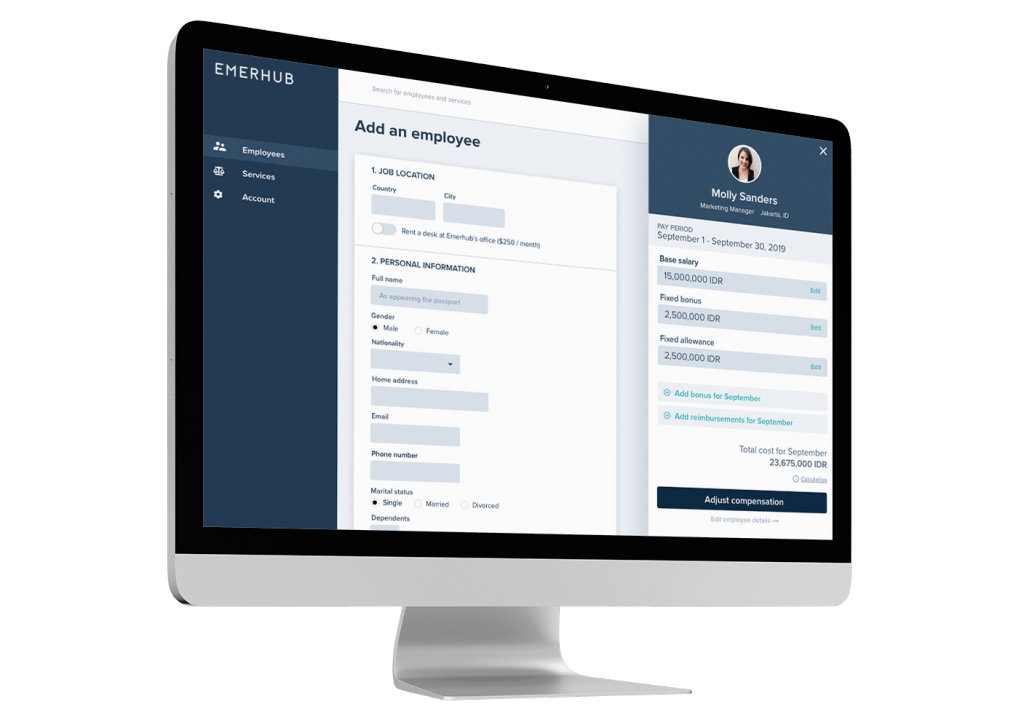Table of contents
Vietnam has become an attractive market for foreign companies after experiencing rapid growth in its manufacturing, tech and IT sectors, all buoyed by the country’s relatively competitive wages.
As the country continues to grow its economy, wages are expected to rise.
Foreign employers looking to attract and retain the best talent need to understand Vietnam’s payroll system and how to develop appropriate salary structures for their employees.
Understanding the salaries in Vietnam
Wage computation in Vietnam
Generally, an employee’s typical monthly salary package includes their gross salary and mandatory insurance contributions.
Salaries and bonuses are subject to personal income taxes (PIT) in Vietnam and are levied on the balance after mandatory insurance contributions have been deducted.
An employee may also receive allowances and monetary or non-monetary benefits designed to retain staff. Some of these are subject to PIT.
Taxable benefits include:
- Housing rent;
- Payments for power, water, and associated services for employees that amount to more than 15 percent of their total taxable income;
- Transportation allowances;
- Premiums for life insurance;
- Health care services.
Prefixed lump sum amounts (or “khoan chi” amounts) for telephone calls and services, stationery, uniforms and per diem allowances are not subject to taxes if the amounts are within the levels set out under regulations.
Foreigners that work in Vietnam are also exempted from PIT on various benefits such as relocation allowances for moving into the country, airfare to their home country, and education fees for their children.
Average salaries in Vietnam across regions
On January 1 2020, region-based minimum wages for non-state employees in Vietnam increased by an average of 5.5%.
With the cost of living dramatically different throughout Vietnam, the government divides the country into four salary regions for the purpose of issuing minimum wages, reflecting the economic realities of the urban/rural divide. The increase in the minimum wage for 2020 is summarised in the table below.
Monthly minimum wage by region
| Region | Areas Included | 2020 Minimum Wage |
|---|---|---|
| I | Hanoi; Hai Phong; Ho Chi Minh City and its neighboring provinces of Dong Nai, Binh Duong, and Ba Ria; Vung Tau | VND 4,420,000 ($190 USD) |
| II | Outskirts of Hanoi and Ho Chi Minh City; other large and medium-sized cities such as Da Nang, Nha Trang, and Can Tho | VND 3,920,000 ($168 USD) |
| III | Smaller provincial cities and suburban districts | VND 3,430,000 ($148 USD) |
| IV | The least developed and sparsely populated rural and mountainous regions of Vietnam | VND 3,070,000 ($132 USD) |
Companies are not permitted to pay unskilled employees monthly wages which are lower than the relevant minimum wage. Wages paid to employees who have undergone vocational training should be at least 7% higher than the minimum salary.
Fresh graduate salaries in Ho Chi Minh City
In Emerhub’s experience, fresh university graduates in Vietnam are receiving on average around US$250 to US$380.
According to a study by JobStreet, Vietnam’s average salary for fresh graduates increased from US$225 in 2017 to US$345 in 2019.
Vietnamese employees commonly join a company on a low salary with the expectation of a significant increase. And the younger the employee, often the steeper the increase. It is not unheard of that employees expect a 40% increase on their salary after one year.
2020 salary guide in Vietnam
Ho Chi Minh City and Hanoi are regarded as having the highest salaries in Vietnam, although this does vary depending on the industry. We have collected data on a range of positions in four main industries below on the current salary ranges for finance, legal, sales and marketing and administrative positions.
Since the differences in salaries between Ho Chi Minh City and Hanoi are relatively small, we have combined the results based on the level of seniority instead of geographical location.
Finance salaries in Vietnam
| Years of experience | Examples of positions | Monthly salary range in Ho Chi Minh City and Hanoi (USD) |
|---|---|---|
| 0-2 | Retail Relationship Manager | 500-800 |
| 2-4 | Credit Approval Officer | 500-1,000 |
| 5-7 | Internal Audit Specialist | 1,500-2,500 |
| 7-10 | Head of Sales (Corporate Banking) | 4,000-7,000 |
Legal salaries
| Years of experience | Examples of positions | Salary range in Ho Chi Minh City and Hanoi (USD) |
|---|---|---|
| 2-4 | Paralegal | 800-1,500 |
| 6-8 | Senior Associate | 3,000-10,000 |
| 8-10 | Legal Counsel | 6,000-15,000 |
Sales and Marketing salaries
| Years of experience | Examples of positions | Salary range in Ho Chi Minh City and Hanoi (USD) |
|---|---|---|
| 1-3 | Account Executive | 500-1,000 |
| 2-8 | Copywriter | 1,000-3,000 |
| 3-8 | Art Director | 1,500-3,000 |
| 8+ | Creative Director | 3,000-5,000 |
Administrative salaries
| Years of experience | Examples of positions | Salary range in Ho Chi Minh City and Hanoi (USD) |
|---|---|---|
| 0-2 | Receptionist | 400-700 |
| 2-4 | Personal Assistant | 1,000-2,000 |
| 4-6 | Office Manager | 1,500-3,000 |
| 7-10 | HR Manager | 2,000-6,000 |
Finding employees in Vietnam
Negotiating salaries with job applicants
It is a common practice to ask for a candidate’s current (or last) salary during the shortlisting process. Usually, candidates expect a 10-50% increase to change jobs.
Emerhub recommends to ask the candidates for their expected salary first and then negotiate if needed. Usually, the candidates are willing to modify their initial request.
Once you agree on compensation, it is standard to pay 85% of the proposed gross salary to the candidate during the two month probation period. During this time the employer and employee negotiate the employment contract and upon completion of the probation period enter into that contract with full salary.
Vietnamese candidates usually provide their desired salary amount as a net salary (after taxes). However, we recommend signing the employment contracts as a pre-tax gross salary to make the payroll calculations easier.
Salaries are paid monthly and a 13th salary is expected, even if not requested.
The best time to hire in Vietnam
The golden period of recruitment in Vietnam is the first two months after the Lunar New Year celebrations. It is a market standard to pay the 13th salary before the Lunar New Year after which employees considering a new position tend to leave their post.
In Emehub’s experience candidates, especially younger employees, tend to leave a job before finding a new position. This means the recruitment cycle can be very fast after the New Year.

Hiring foreign workers in Vietnam
Currently, there is no enforced ratio that companies must adhere to when employing foreign nationals and local employees. Expert positions can be filled by a foreigner if they have three years of experience and higher education, but both must be evidenced.
In order to apply for a work permit for a foreign employee, the employer needs to provide sufficient reasons such as international experience, a good level of English and specialist skillset required for the position. From January 2021 an approval from the Labour Department will also be required.
Paying the 13th salary in Vietnam
It is also possible to motivate employees to stay with your company by paying more than one month’s salary as the 13th salary (Tet bonus). This is common in sectors where employees are harder to recruit and retention is more important.
Salaries do not tend to be a well-kept secret in Vietnam, so depending on the salary levels it is common that people ask for an increase before the first year is over if they feel that others are paid more for a similar level position.
Recruitment in Vietnam with Emerhub
For companies looking to recruit it can be time-consuming to understand the hiring and salary standards in Vietnam and working with a specialized recruitment service helps to navigate some of these challenges.
Our consultants can assist your company to match the right talent to the right role, and help you with all of the administration associated with recruitment including setting salary and managing candidate expectations.







